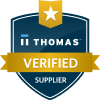Industrial brushes are an essential part of many industries because of their capabilities to clean, abrade, polish, apply coatings, and remove dust. They also move, position, and hold products during the manufacturing process.
Industrial brushes are especially useful in filling gaps between moving surfaces, controlling dust, directing airflow, and guiding cables. For outdoor businesses, they act as important barriers to keep out birds and pests.
Brushes are used in industries such as:






















